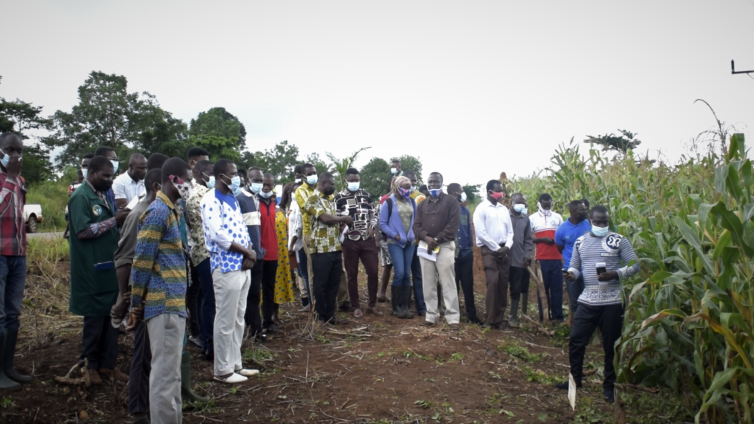The Soil Research Institute (SRI) of the Council for Scientific and Industrial Research (CSIR) has rolled out new technologies for effective management of soil fertility for increased crop yield.
The move is to support the government's flagship programme of planting for food and jobs.
The CSIR-Soil Research Institute has been carrying out demonstrations to showcase some of its fertility management strategies to increase maize yield at Biokrom in the Tano South District.
The newly developed technology is geared towards improving agricultural sustainability in the country.
Two regions have benefited from the implementation of the new technology rolled out by the Soil Research Institute.
Dr. Emmanuel Dugan is a research scientist at the Soil Research Institute.
“The growth and yield of every crop, including maize is strongly influenced by soil fertility management.
“Effective soil’s fertility management is one of the most important factors for improving productivity and increasing maize crop.
“The Council for Scientific and Industrial Research CSIR-Soil Research Institute SRI) is supporting government's flagship programme of planting for food and jobs by rolling out technologies for effective management of soil fertility for increased crop yield,” he said.
The Institute observes inappropriate farm practices have contributed to soil fertility decline across the country.
This affects the quality and quantity of farm yields.
“Soil fertility decline has been identified across the country, as a factor contributing significantly to low yield of crops.
“The extent however varies from region to region
“Soil fertility does not only affect the quantity of crop yields but also quality as well,” he noted.
The Chief Executive for Tano South Municipality, Collins Offinam Takyi, advised farmers to adopt the modern farming methods introduced.
“Farmers have to rely on science and research so they can apply the new technologies on their farms
“They should also desist from the traditional way of farming if they want to improve their yield, income and livelihoods,” he emphasized.
Some of the new technologies for soil fertility introduced in the Ahafo Region include: Biochar (a soil conditioner that helps to conserve both soil nutrients and moisture).
Mineral fertilizer; a new fertilizer blend (NPK 15-20-20+Zn) specifically developed and recommended at 90-60-60 kilogram per hectare by the CSIR -SRI for transition and part of semi-deciduous agroecology.
The new technology was developed by the CSIR-SRI in collaboration with the Department of Agriculture (DoA) and sponsored by the Government of Canada through Modernizing Agriculture in Ghana (MAG).
Latest Stories
-
Ghana shouldn’t have experienced any ‘dumsor’ after 2017 – IES Boss
26 mins -
Lamens flouted some food safety laws in re-bagging rice – Former FDA Boss Alhaji Hudu Mogtari
59 mins -
Afcon exit: Our issue is administrative failure and mismanagement, not lack of talent – Saddick Adams
1 hour -
WAPCo to commence major pipeline maintenance and inspection from November 25
1 hour -
CEO of Oro Oil Ghana Limited Maxwell Commey listed among the 100 Most Influential People Awards, 2024
2 hours -
Power crisis: Amandi is off due to maintenance, not debt – ECG Boss
2 hours -
Votes cast for late Akua Donkor to be declared invalid – Electoral Commission
2 hours -
You can’t keep “incompetent” Otto Addo for the long term – Countryman Songo
2 hours -
Joy FM holds 2024 Prayer Summit for Peace
3 hours -
Lady sues Police and AG over assault in custody
4 hours -
Ghana’s railway sector has been revived under my leadership – Akufo-Addo
4 hours -
Next government must enforce C190 – Women Economic Dialogue Forum
4 hours -
NCCE engages party youth activists at Nandom on peaceful election
4 hours -
SSNIT engages stakeholders on its operations
4 hours -
Defilement: 19-year-old farmer jailed ten years, with hard labour
4 hours

